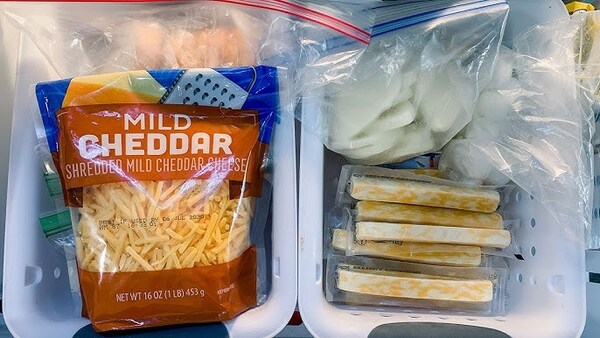you can freeze cheese, but the results depend on the type of cheese and how you plan to use it. Here’s a guide:
Which Cheeses Freeze Well?
- Hard and Semi-Hard Cheeses
- Examples: Cheddar, Gouda, Parmesan, Swiss.
- Freezing works well for these cheeses, but they may become crumbly after thawing. They are best used for cooking or grating.
- Soft Cheeses
- Examples: Brie, Camembert, Cream Cheese.
- Freezing can alter the texture, making them less creamy. They’re best used in cooked dishes.
- Shredded Cheese
- Freezing shredded cheese works very well and is convenient for recipes like pizzas or casseroles.
- Processed Cheeses
- Examples: American cheese, cheese slices.
- These freeze well and retain their texture.
How to Freeze Cheese
- Prepare the Cheese
- Block Cheese: Cut into smaller portions to avoid refreezing.
- Shredded Cheese: Store in resealable freezer bags or airtight containers.
- Soft Cheese: Wrap tightly in plastic wrap and place in a freezer-safe container.
- Wrap and Protect
- Wrap the cheese in plastic wrap, then place it in an airtight freezer bag or container to prevent freezer burn.
- Label and Freeze
- Label the package with the type of cheese and freezing date.
How Long Can You Freeze Cheese?
- Most cheeses can be frozen for up to 6 months, but it’s best to use them within 2-3 months for optimal flavor and texture.
How to Thaw Frozen Cheese
- Thaw the cheese in the refrigerator for several hours or overnight.
- Avoid thawing at room temperature, as it can cause condensation and alter the texture.
Tips
- Avoid freezing fresh cheeses like ricotta and mozzarella, as they can become watery.
- Use thawed cheese in cooked dishes where texture changes won’t matter, like casseroles, soups, or sauces.
Freezing cheese can be a great way to reduce waste and save money, but it’s important to use it in the right context to enjoy the best results!










